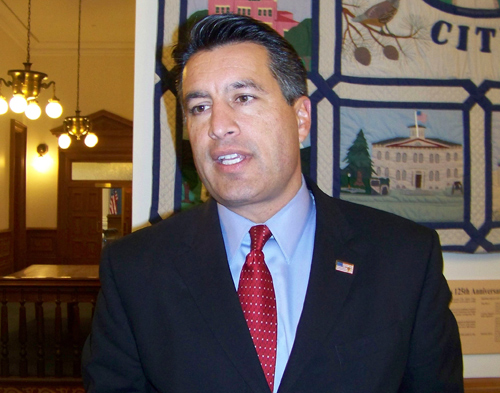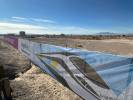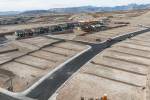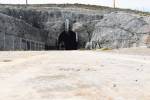Aide says Sandoval may try to grab school, local government funds
CARSON CITY -- Gov.-elect Brian Sandoval won't raise taxes, but he might try to grab funds from schools and local governments and secure money by selling state buildings and then leasing them back, his senior adviser said Wednesday.
Dale Erquiaga said the new administration "will look at everything but tax increases."
Officials also might consider transferring some programs now operated by the state to local control as a way to save funds, he said, but emphasized nothing is certain at this time.
He said specific details on Sandoval's plans -- which he mentioned in his gubernatorial campaign -- won't be released until Jan. 24, when the proposed budget is given to legislators.
Sandoval intends to meet in coming weeks with school district and higher education officials, along with local government officials, and discuss options to secure revenue for the state, Erquiaga said.
The governor-elect was not available for comment Wednesday.
State Budget Director Andrew Clinger said Tuesday that Nevada faces a $1 billion revenue shortfall. He expects that about $5.4 billion will be available for the next two-year state government budget, compared with $6.4 billion in the current budget that ends June 30.
The governor-elect is meeting this week with state agency administrators and deciding whether some of them will be reappointed to serve in his administration. Sandoval takes office Jan. 3.
During the special legislative session in February, then Senate Minority Leader Bill Raggio, R-Reno, made an unsuccessful attempt to implement Sandoval's state building sale and lease-back plan.
Democrats quickly rejected the idea, although Raggio said it might bring the state $250 million, or more, depending on the number of buildings that were sold.
Under the plan, the state would sell a building, excluding the Capitol, receive a large sum of money, and then lease the building back for a number of years, possibly 20 years, when it would reclaim ownership. Arizona has used the concept to secure money to cover shortfalls.
Gov. Jim Gibbons said the sale and lease-back plan was just delaying making a real fix to state budget problems, and Assembly Speaker Barbara Buckley, D-Las Vegas, questioned whether high rental charges would make the idea cost-prohibitive.
Erquiaga noted Wednesday that Sandoval mentioned during the campaign that state government might need to take school district capital construction funds to cover its shortfall. The Clark County School District had a capital improvement fund of $900 million earlier in the year, but it has been rapidly depleted as funds were spent on school renovation.
"Everything has to be on the table," said Erquiaga, a former employee of the school district.
Joyce Haldeman, associate Clark County superintendent, said Wednesday that only about $300 million remains in the construction fund. While no new schools are scheduled for construction, she said, the money is earmarked for renovating older schools.
During a special legislative session in February, the Legislature did take -- with the school district's support-- $25 million in construction funds to cover the state revenue shortfall.
Haldeman said at the time that she and Superintendent Walt Ruffles agreed to the transfer of the funds to the state.
"The choice was between that or facing additional cuts," Haldeman said in March. "Why worry about using the funds for remodeling schools if you don't have money to pay for teachers?"
But she said Wednesday that the school district faces $4.9 billion in school repair and renovation costs over the next five years and taking the construction funds would be wrong.
"I would be opposed to him doing this," Haldeman said. "Voters approved this money for school construction. We would lose credibility for future projects (if the state took school construction funds)."
In essence, Sandoval would be taking money Clark County voters meant for local schools and then spending it for state purposes in counties other than Clark, she said.
Haldeman said the school district added about 500 new students in the fall and lost 1,000 in the last school year. It has about 309,000 students.
She said taking the school district funds would violate the intention of advisory Question 5 on the Nov. 2 ballot, which states that the Legislature should not take local government funds, or mandate higher local government spending, without the approval of the affected governments.
Erquiaga emphasized that no decisions have been made about raiding other governments' funds, but added Sandoval has directed Clinger to prepare a list of all possible options.
Jeff Fontaine, executive director of the Nevada Association of Counties, said Question 5 passed in 15 of the 16 counties were it was on the ballot with an overall favorable vote of 55.59 percent. It failed by a narrow margin in Nye County.
Fontaine released a list showing that $283 million has been taken from local governments by the Legislature since 2008. This does not include another $62 million that could be taken from the Clean Water Coalition fund in Clark County.
Legislators approved the grab from the water coalition during the special session in February, but the group has sued to block transfer of this money to the state general fund.
Fontaine said his organization isn't saying the state cannot take local funds in times of economic problems, but that it first needs to secure permission from the affected governments.
"What we hope is that if the governor-elect wants to go that route, that he will have discussions with the local governments that would be impacted," Fontaine said.
Although a state revenue shortfall of at least $1 billion is probable, Sandoval has been taking a positive tone because options are available and tax increases will not be needed, according to Erquiaga.
State spending will be cut, with some agencies absorbing higher cuts than others, he said.
But Medicaid is a "state responsibility" and cannot be cut, he noted.
Clinger estimated Tuesday that it will cost the state $200 million more in the next two-year budget to cover an increased Medicaid caseload. Medicaid is the free health care program for the poor, disabled, blind and some of the elderly.
"The budget numbers are bleak, I will give you that, but the governor-elect is optimistic because the problems can be managed," Erquiaga said. "There is no reason to scare the state work force now."
Contact Capital Bureau Chief Ed Vogel at evogel@ reviewjournal.com or 775-687-3901.




























